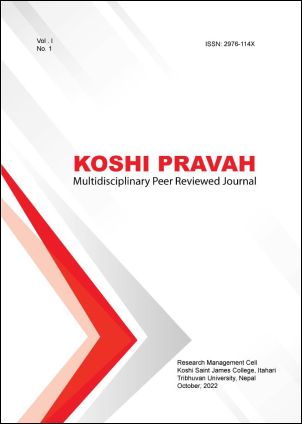Triumph of Humanity over Communal Violence and the Aesthetics of Trauma in Manto's "Mozel"
DOI:
https://doi.org/10.3126/koshipravah.v1i1.57234Keywords:
partition violence, religiosity, humanitarian, aesthetic of trauma, identity-politicsAbstract
This article explores the aesthetics of trauma based upon virtue over vice in Saadat Hasan Manto’s story “Mozel”. As one of the renowned writers of partition literature, he has penetrated the limitations of trauma politics that fosters on demonizing the perpetrators to justify the innocence of the victims. Through Mozel’s character - herself a victim of communal violence of the Partition - the writer has portrayed a humanitarian worldview on trauma, its victims and perpetrators; and a constructive, positive and reconciliatory approach to its settlement. A free-spirited Jewish woman, Mozel enacts nobility beyond all communal prejudices and religiosity that her friends Tirlochen and Kirpal Kaur represent. She starkly criticizes Tirlochen’s communal rigidity as a Sikh despite her love for him. Sketched as a disillusioned woman from the sectarianism and identity politics of religious wars, she saves two lives of trauma victims although they belong to Sikh community, a different faith from her own. To argue against trauma politics for the advocacy of universal moral ground as the aesthetic of trauma, the cultural and revisionist theories of trauma mainly of Alexander C. Jeffrey and Gilles Deleuz have been brought into reference respectively. Mozel’s character is discussed as a retrieved human(e) hero for her sacrificial deed of salvaging two victims of religious riots from feminist perspective.




